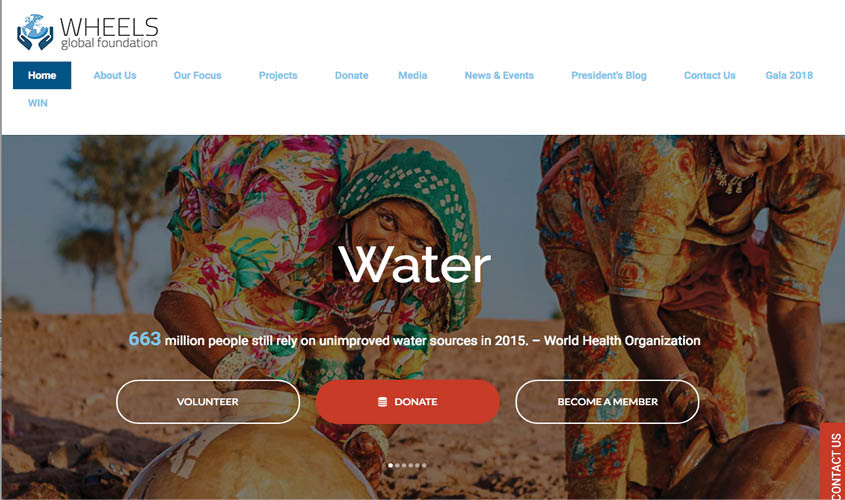Washington DC: Call it the “Art of Giving to the motherland, the techies’ way”.
After building America with their brains and grit, the Indian techies are going all out to leverage technology to enhance social impact on Indians back home, particularly those on the fringe of development. At a gala in Philadelphia recently, Wheels Global Foundation (WGF), a Pan-America body of techies (mostly IITians), entrepreneurs and news making venture capitalists gave a glimpse into some concrete nation building steps for India.
From adopting a village to bringing in micro energy grids, to electrifying local villages, to addressing challenges in rural healthcare of women, to installing clean drinking water plants to encourage the concept of “sevaks” (volunteers) in the villages for addressing local needs, the techies’ meet had in attendance the who’s who of America and the newsmakers in entrepreneurship, philanthropy, academia, health, science and business sectors.
And it touched a few pertinent areas currently India confronts and has no answers to amidst constraints of expertise and funds. One such most striking session through the day-long event was on rare diseases. Social philanthropist Harsha Rajasimha of the Organization for Rare Diseases India (ORDI) has his venture Jeeva Informatics building a Virtual Clinical Trials Platform to take clinical trials to patients’ homes to eliminate or reduce the need for patients travelling to trial sites. Rare Disease Care Coordination Centre, a multidisciplinary centre exclusively dedicated for rare diseases, has been established in Karnataka’s children’s hospital with implementation ongoing in Tamil Nadu, and the proposal has been sent to all 29 states and Union Territories of India. The centre utilises telehealth approach to engage patients nationally with a helpline phone number and hub and spoke model.
Wheels’ own “India Niswarth (WIN) Foundation”, a charitable body set up by a young Indian origin entrepreneur, Chirag Patel, co-CEO and chairman, Amneal Pharmaceuticals and his family, is finding new ways to improve water quality and health outcomes for mothers and children. He has donated $2 million to the cause already. Patel said, “Our vision is that the WIN Foundation will serve as an India based incubator for technology-based ideas that can be tested and put into action to improve the daily lives of people living in underdeveloped areas around the world.”
The Foundation’s activities are focused on two tracks: Water and Sanitation (WATSAN) and Maternal and Child Health (MCH) and are housed on the campuses of IIT Gandhinagar (IITGN) and the Indian Institute of Public Health Gandhinagar (IIPHG) respectively.
Besides, even before Pad Man became a hit on Indian silver screens, these India-born techies, who have always remained ahead of the curve, have got into manufacture and distribution of cheap sanitary napkins for young girls and women in rural India. “Under the Kanya project, we had already distributed over 23,000 sanitary napkin packets to 7,500 girls in government schools and about 20,000 women have been taught about menstrual hygiene in Telangana…We are now addressing this issue in other states as well,” said Ambassador Pradeep Kapur of Wheels Global Foundation.
Added Suresh Shenoy, President of Wheels, who is also a venture capitalist and IIT Mumbai alumnus: “A village is covered in every single Kanya Project at a cost of $20,000. By 2020, we are targeting 25 Kanya projects at a cost of $500,000 to address this hygiene issue among girls.”
Making available pure water, cheap and sustainable energy resources and spoken videos to enhance learning experience among the rural students by leveraging technology is also on the agenda of these techies in America, who still look to India whenever an opportunity is thrown at them.
****
There is some good news on the visa front from the US for “meritorious Indians”.
The Department of Homeland Security (DHS) announced on Friday that it would require petitioners seeking to file H-1B cap-subject petitions to first electronically register with US Citizenship and Immigration Services (USCIS) during a designated registration period. Under the proposed rule, USCIS would also reverse the order by which USCIS selects H-1B petitions under the H-1B cap and the advanced degree exemption, likely increasing the number of beneficiaries with a master’s or higher degree from a US institution of higher education to be selected for an H-1B cap number, and introducing a more meritorious selection of beneficiaries.
Incidentally, more Indians are doing masters than any other foreign nationals, and those coming to STEM courses to US institutions also have Indians among the highest numbers, even higher than China.
Usually, in the USCIS, when it receives more than enough petitions to reach the congressionally mandated H-1B cap, a computer-generated random selection process, or lottery, is used to select the petitions that are counted towards the number of petitions projected as needed to reach the cap.
Currently, in years when the H-1B cap and the advanced degree exemption are both reached within the first five days that H-1B cap petitions may be filed, the advanced degree exemption is selected prior to the H-1B cap. The proposed rule would reverse the selection order and count all registrations or petitions towards the number projected as needed to reach the H-1B cap first. Once a sufficient number of registrations or petitions have been selected for the H-1B cap, USCIS would then select registrations or petitions towards the advanced degree exemption.
The Homeland Security announcement stated that “the proposed change would increase the chances that beneficiaries with a master’s or higher degree from a US institution of higher education would be selected under the H-1B cap and that H-1B visas would be awarded to the most-skilled and highest-paid beneficiaries.”
A win-win for India and bright Indians!
Maneesh Pandey is Senior Executive Editor of ITV Network and currently a Fulbright Visiting Professor at Delaware State University, USA.

